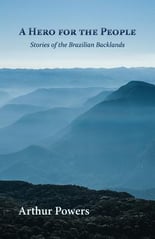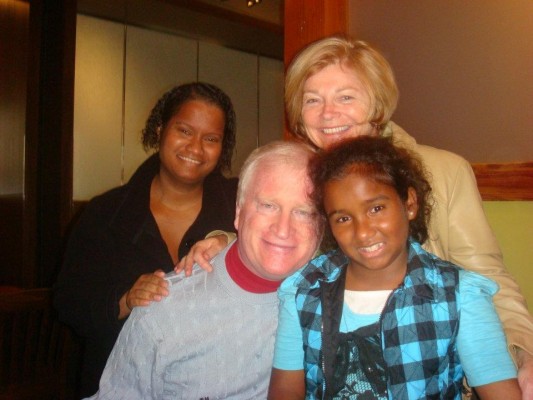Today, I'm thrilled to share a conversation I had with an author whose writing I only just discovered.

I read A Hero for the People: Stories of the Brazilian Backlands, by Arthur Powers (Press 53, 2013) and found myself thinking it was a memoir. It was utterly delightful, a collection of vignettes about the Brazilian backlands. These stories weave together to highlight the Brazilian people in an anecdotal way.
What really caught my attention about this book was the writing. I'm an avid reader, and this year I've read more books than I have in the last ten years. It's really made me appreciate good writing (and editing, too, but that's a different topic...).
But I'm also a writer, and this book captured my writer's imagination too. I can't help but appreciate the work that went into it...and that leads to about 1000 questions for the person whose name's at the bottom.

So, with that, join me as I yak it up with Arthur Powers about his newest book.
Arthur, your collection of stories, A Hero for the People, is one I'm sharing with all my friends. Tell us why you wrote it. What inspired you to share stories about the Brazilian backlands?
Thanks, Sarah, for your kind comments on the book, and for the interesting questions. I find that questions often spark me to look at aspects of my writing that I haven't thought about.
A good deal of writing is instinctive - a sense of craft (rhythm, timing, harmony, tonality) that becomes almost second nature with time. Add to that inspiration. Often a reviewer or interviewer points out something to me about my writing and my reaction is: I never thought about that, but it's true.
What inspired me to write about the Brazilian backlands? I spent much of my life there. From 1969 to 1973, I was a Peace Corps Volunteer, working as a community organizer, mostly in rural areas and small towns. I developed a tremendous respect for the people, who often lived hard lives but with dignity, honor, a sense of humor, and great generosity.
Later, after living in Rio de Janeiro a few years (where my wife, Brenda, worked in the slums), Brenda and I went to work for the Franciscans in the eastern Amazon region, and got to know the people even more deeply. We spent seven years in the Amazon (Brother Michel's work in "A Hero For The People" most closely mirrors what we did).
We later worked in the drought-ridden Brazilian Northeast - at that time the largest pocket of poverty, outside of Haiti, in the Western Hemisphere - on relief and development programs largely aimed at supporting subsistence farm families.
How did you come to be so familiar with the Brazilian people and the specific lifestyle and mindset found throughout this book?
As I mention above, Brenda and I were community organizers in the Peace Corps, then community organizers and pastoral workers with subsistence farmers and in small towns in the Amazon and Northeast. We shared deeply in the lives of the people - working side by side, doing sacramental preparation, developing a marriage enrichment program, going through dangerous situations connected with the people's struggle for land. One gets to know people pretty well.
What do you hope Catholic readers take from this book?
I don't really think of Catholic readers as separate from readers in general. Of course, sometimes I write a story that is so imbued in Catholic culture that it would be difficult for a non-Catholic to understand, but generally this is not true of the stories in A Hero For The People.
As any good writer does, I seek to share stories with my readers. I hope that the reader will encounter living, breathing characters - will experience what those characters experience. There are all kinds of good things about fiction - I read of one study, for instance, that indicates that readers of fiction tend to be more empathetic. But - wonderful as that is - I don't write for that purpose. I write because I have stories welling up inside me that I want to share.
What was the most inspiring or rewarding part of writing this book and/or compiling these stories?
Writing a well-crafted short story is its own reward. There is a tremendous satisfaction in it. As a craftsman, I can look at the stories in A Hero For The People and be deeply satisfied with their workmanship.
And finally, when the writing got tough, how did you crack it? Do you have a secret stash of coffee or chocolate that helps you through? (Not that I know any writers who do that...)
I do drink coffee (now, in summer in North Carolina, lots of iced coffee) and I am inordinately fond of dark, not-very-sweet chocolate (we buy a Fair Trade chocolate at church with coffee-beans in it - it's terrific!)
But neither coffee nor chocolate has a great deal to do with my writing. The toughest part of writing, for me, is getting started. Once I do, the work flows. My mind is surging with stories crying to be told.
Be sure to check out our Book Notes archive.
Copyright 2013, Sarah Reinhard
About the Author

Sarah Reinhard
When she’s not chasing kids, chugging coffee, or juggling work, Sarah Reinhard’s usually trying to stay up read just one … more … chapter. She writes and works in the midst of rural farm life with little ones underfoot. She is part of the team for the award-winning Catholic Mom’s Prayer Companion, as well as the author of a number of books.



.png?width=1806&height=731&name=CatholicMom_hcfm_logo1_pos_871c_2728c%20(002).png)
Comments